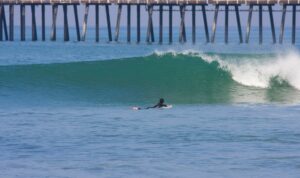What really are rip currents and what are the pros and cons? This blog will hopefully clarify what a rip current is, how to spot one and how to use one to your benefit if you’re a surfer!
First and foremost, a rip current may also be referred to as a rip tide. By definition a rip current is two or more channels of water that flow away from the shore and out to sea. As waves come into the shore, and fills pockets in the sand, water piles up and has to find somewhere to go. Instead of returning over the reef or sandbar from which it came, the current may take t he path of least resistance and be funneled into a channel between two obstacles.
There are three main kinds of rip currents you should be aware of. The first is a flash rip. A flash rip current can form suddenly and vanish just as fast due to decreasing water levels or increasing wave heights. Another is a fixed rip current. A fixed rip, sometimes formed between sand bars, can stay in the same place for days, weeks, or even months. Lifeguards are usually aware of these and mark them for swimmers and beach-goers. And the third is a permanent rip current. These are most common near and on reefs that pose a permanent obstacle.
Here are a few photos of rip currents to help you better visualize:
To the average swimmer a rip current can be a problem. I myself have gotten caught in a few without noticing until it was too late. So what should every swimmer know in case this happens to you? Simple. Stay calm, and swim to your left or your right parallel to the shoreline. The rip current will not pull you under but it will pull you away from the beach.
To the average surfer, a rip current is an easy way to get out to the surf break with the least amount of effort. Instead of paddling through waves you may sometimes see surfers taking the rip out. Think of it s a sling shot to get you to the outside!
Hope this blog has answered a few of your questions or concerns about rip currents!







